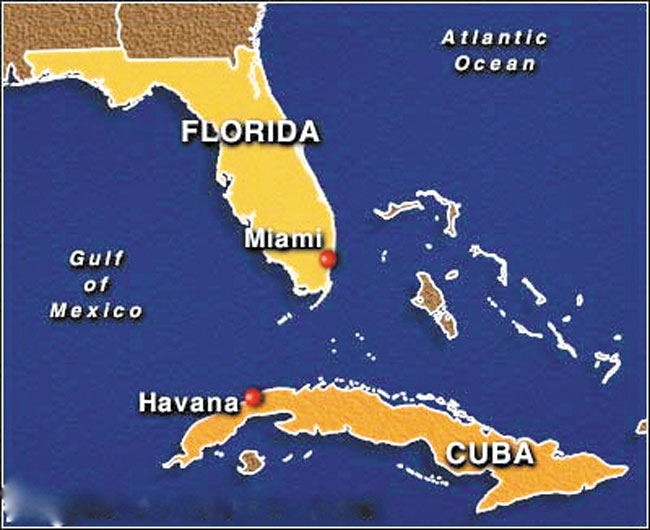Cuba, The Castros And Capitalism
What a marvelous way to start the new year: the U.S. getting back in the global ball game with Cuba!
Back-to-back homers by President Obama: the immigration executive order and reconnecting with that island 90 miles off our southeastern shore.
It never made sense to me to break with Cuba. I went there in 1955 as a reporter with the St. Petersburg (Fla.) Times.
If human rights was to be the breakup issue then, it should certainly have been raised years earlier under the dictatorship of Gen. Fulgencio Batista.

Cuba has been so close yet so far for more than 50 years | IMAGE FROM BOB JONES
Our relationship with Cuba harks back to World War II days, when we became very dependent on it for sugar.
And when then-elected president Batista sensed he’d not be re-elected, he staged a military coup. But America kept supporting him.
We gave him airplanes and arms to fight rebels. We were worried about American hotel/casino properties there, and our mafia had its fingers deep in the Havana casino business.
In 1959, Fidel Castro took the country. He declared himself a communist, seized all U.S. property and shut the casinos.
President Dwight D. Eisenhower broke off diplomatic relations.
Cuba became a client of and partner with the Soviet Union. Then came that 1962 missile crisis.
Also, as the book The Cuban Dilemma of the United States points out, “Americans, unlike most Europeans, are not used to hostile neighbors. We shudder to think of an enemy just 90 miles away. Whether that enemy has any viable threat potential does not really matter. Cuba and Castro represented a foreign intrusion into an area which Americans have historically felt was their own.”
Cuban exiles began flooding into Florida.
By last year, almost 20 percent of Florida’s population was Hispanic.
And they wanted no concessions to the Castro brothers, even without Fidel at the helm.
But the embargo never made sense. We are friends with communist China and Vietnam and Laos, and dictatorial Saudi Arabia.
Cuba may be communist, but it has great health care, high literacy and low infant mortality.
Cuban leader Raúl Castro has said he would “never permit the return of the capitalist system.”
But as The New York Times reports, there is no longer any denying that large pockets of capitalism are emerging.
Small businesses are every- where. Taxis and restaurants have a rush of new entrants.
Even formerly state-controlled functions such as food are moving toward a private system that sets its prices based on supply and demand.
Capitalism is a natural progression. Socialism has some appeal because of the fear of the 1 percent accumulating onerous wealth.
But most humans yearn to have at least a piece of that wealth, and that’s why we become merchants and innovators.
We’d have no iPhones or micro-processors without that wealth incentive.
The Castros soon will be gone and America needs to be there to make its pitch for democracy.
So three cheers for Obama doing what’s both right and in our best interest.





